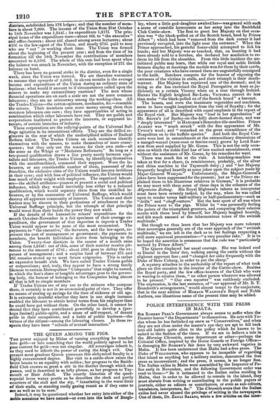THE QUEEN AMONG THE PIGS.
Tstia power enjoyed by Midas of turning everything he touched into gold—or into something that the world politely agreed to let pass current for gold—was not singular. All sovereigns inherit it, as they used to inherit the power of curing the king's evil. Our present most gracious Queen possesses this alchymical faculty in a highly concentrated degree. Her visit to a cattle-show raises the brute beasts to an equality with nobles; her progress to the Smith- field Club creates as great a stir in the district through which she passes, and is described in as lofty phrase, as her progress to Tay- mouth or Blair Atholl. The courtly historian of the quad- rupedal levee waxes poetic as he describes the sleek and portly courtiers of the stall and the sty, " luxuriating in the warm litter of their stalls, or standing coolly gazing round as if they came to see as well as to be seen."
Indeed, it may be questioned whether her entry into either of the noble mansions we have named—or even into the balls of Burgh-
ley, where a little god-daughter awaited her—was graced with such a scene of comkdie larmoyante as her entry into the Smithfield Club Cattle-show. The first to greet her Majesty on that occa- sion was " the black-polled ox of the Scotch breed, bred by Prince Albert " ; which had been " removed from the dark corner it had previously occupied, into the light near the entrance." When the Prince approached, his grateful foster-child attempted to lick his bands ; and her Majesty was so touched, that, on learning it bad been already sold to a butcher, she declared her resolution to re- deem its life from the shambles. From this little incident the un- initiated public may learn, that while our royal and noble British farmers display at meetings the medals won for them by their cattle, the poor creatures who have earned them are ungratefully consigned to the knife. Butchers compete for the honour of exposing the carcasses of the victims in stalls, and their triumph is their death- warrant. Her Majesty has reprieved one of the doomed; and in doing so she has exercised the Royal Prerogative at least as ju- diciously as a certain Viceroy when on a tour through Ireland. HENRY the Eighth knighted Sir-Loin ; VICTORIA cannot do less than make "the black-polled ox of the Scotch breed" a baronet.
The beasts, and even the inanimate vegetables and machines, seem to have caught inspiration from the visit of Royalty ; for the
appearance of all is described with equal emphasis in the report of the Royal visit. Her Majesty was "loud in her approbation" of Mr. Snares (of Burley-on-the-hill) short-horned steer, and was " deeply interested " in HAranza'sBenenden tile-machine. Prince ALBERT was "much struck" with the fine appearance of Mr. Urrox's wool ; and " remarked on the great resemblance of the Neapolitan ox to the buffalo species." And both the Royal Con- sorts were lost in astonishment at the extraordinary dimensions of a mangel-wurzel (want-root or famine-root) grown by Lord RAD■ NOR from seed supplied by Mr. GIBBS. This is not the only occa- sion on which the noble Earl has of late excited astonishment, even without the assistance of Mr. GIBBS, by his remedies for want. There was much fun at the visit. A hatching-machine was taken at first for a churn, (a reminiscence, probably, of the silver and china machine in the Taymouth dairy; ) and " her Majesty frequently laughed heartily at some jokes upon the subject made by Major-General Wemyss." Unfortunately, the Major-General's jokes have been suppressed for the present; but as " the Prince ex- plained them to his illustrious relatives in German," it is probable we may meet with them some of these days in the columns of the Allgemeine Zeitung. His Royal Highness's talents as interpreter must have been severely tasked, by the way, when he was called upon to render terms half-military or half-parliamentary—such as "drills" and " chaff-cutters." But the best sport of all was when the Prince went to the pigs. Whilst he " was personally feeling the points of the triumphant grunters, and comparing their relative merits with those bred by himself, her Majesty laughed heartily, and felt much amused at the inharmonious tones of the swinish multitude."
But though we thus learn that her Majesty was more tolerant than sovereigns generally are of the near approach of the "swinish multitude," we are left in the dark as to her feelings respecting a still more equivocal presentation—" a very peculiar rake." It is to be hoped the assertion is erroneous that the rake was " particularly noticed by Prince Albert."
The Queen displayed her usual courage. She was indeed cool as Daniel in the lions' den, walking among the cattle without the slightest apparent fear ; and " changed her sides frequently with the Duke of Saxe Coburg, in order to pat the sheep."
A mystery attaches to the authorship of the report of what took place on this occasion in the interior of the Cattle-show. Besides the Royal party, and the few office-bearers of the Club who were in waiting to receive them, " no other person whatever was allowed to be present." " Our own reporter" was ruthlessly excluded. The expression, in the last sentence, of "our approval of Mr. B. T. Brandreth's arrangements," would almost tempt to the conjecture, that in the next edition of HORACE WALPOLE'S Royal and Noble Authors, one illustrious name of the present time may be added.


























 Previous page
Previous page